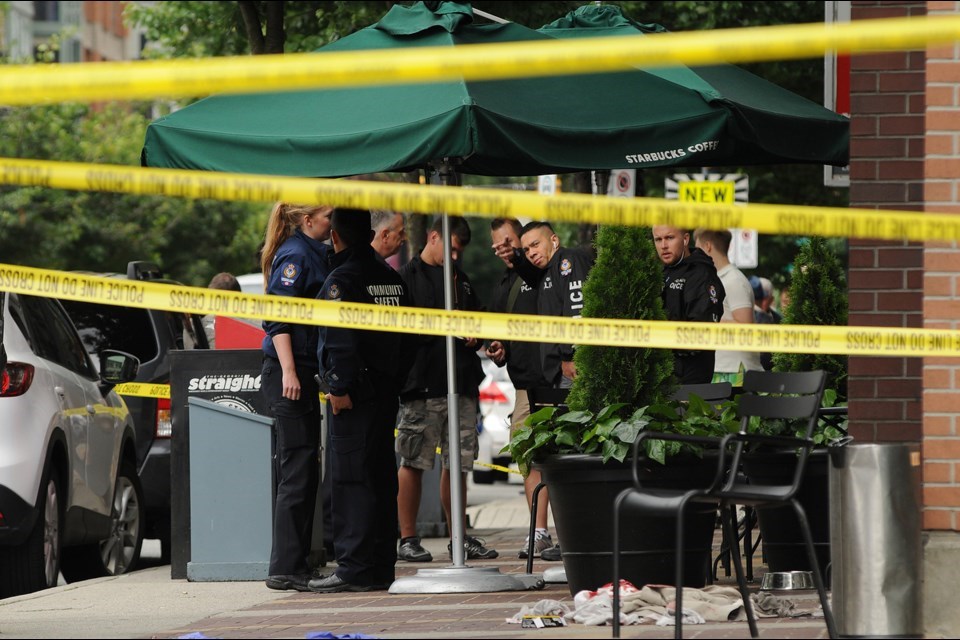City council has agreed to spend $665,000 over the next 21 months on an experiment aimed at responding to concerns in three Vancouver neighbourhoods related to street disorder, public safety and homelessness.
The initiative, which council passed unanimously March 2, is called “Better Together: Neighbourhood Collective Action Project” and focuses on Mount Pleasant, the Olympic Village and the south end of downtown, which includes the Granville Street corridor and Yaletown.
The project’s goal is to enhance and improve neighbourhood-based responses to matters such as poverty-related street disorder — often fuelled by people living with a mental illness, a drug addiction, or both — that typically are dealt with by police.
But the staff report is clear the project has its limitations, noting the underlying causes of homelessness such as poverty, mental illness, addiction and lack of affordable housing are beyond the scope of the experiment.
“While scoping such a program happens from a constructive perspective, it was also recognized that not every issue will be resolved given the complexity and interdependencies of systems and also the unique circumstances of each situation,” the report said.
Neighbourhood cleanliness
The stated objectives, as outlined in the report, are:
- Improve access to support services for “equity-denied individuals” and those people living on the street.
- Improve sense of safety and connection for all neighbours and reduce stigma against people experiencing homelessness and other equity-denied people.
- Maintain neighbourhood cleanliness.
- Improve communication between community organizations such as business improvement associations, residents’ associations and service providers, and city departments.
The project begins this month and runs until December 2023.
$50,000 evaluation
The Eastside Movement for Business and Economic Renewal Society, a charity registered with the Canada Revenue Agency, has been granted $300,000 to provide a “peer-based community stewardship program in [the three neighbourhoods] and to support low-barrier employment opportunities, neighbourhood and resident engagement and enhanced liaison with businesses.”
The Homelessness Services Association of BC will receive $140,000 to coordinate with agencies to provide education and training to community members in Downtown South, Mount Pleasant and the Olympic Village on the impacts of trauma, colonialism, racism, gender-based violence, poverty and unsheltered homelessness.
Another $175,000 will be spent on staffing and $50,000 will fund an evaluation of the project.
The $665,000 will come from what is called the “Great Beginnings” trust fund, which was created after the provincial government provided $10 million to the city more than a decade ago to celebrate the history, heritage and culture of Vancouver’s first urban areas.
“The Great Beginnings program objective is to create a legacy of improved physical, social and economic conditions as well as seeding future opportunities in these neighbourhoods,” the staff report said.
'Doing nothing not an option'
In her closing comments at city hall March 2, Coun. Christine Boyle emphasized the need for the project but warned that such initiatives are not sustainable in the long term, if grants are the only means to make them happen.
“If we want mental health and poverty-related alternatives to policing, they can’t just be through grants to non-profits,” Boyle said. “As we see in other places, the longer-term need is for a new public service that’s reliably and consistently funded over a long period of time.”
Coun. Lisa Dominato said she appreciated the project is an attempt by staff to do something different to engage residents and to be “responsive to feedback and the gaps that we’re seeing in our communities right now.”
“It’s certainly been exacerbated by the pandemic, there’s no doubt — we’re seeing it across the country,” Dominato said. “But being idle and doing nothing, is really not an option.”
Coun. Sarah Kirby-Yung said public safety has been top of mind for many residents.
"No matter your neighbourhood, your background, your economic circumstance — and I think we need to be trying a number of different measures to try to address that," said Kirby-Yung, noting residents look to civic governments for leadership but added that social issues are complex and require all governments to be invested to make improvements.




